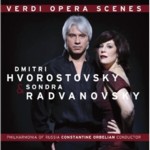This CD, recorded live on June 24, 2008, is a response to those who think/say that there are no fine Verdi baritones and sopranos anymore–i.e., since Milanov, Price, Tebaldi, Caballé, Merrill, Warren, and Milnes left the scene. Dmitri Hvorostovsky’s voice may be a bit light and Sondra Radvanovsky may not have the sheer beauty of tone to be in such company, but they’re both worth walking a mile to hear.
Hvorostovsky’s sound is simply gorgeous and utterly even from top to bottom. He neither ducks nor fudges the low nor high notes in “Eri tu” or elsewhere. His legato practically defines the Verdi line–has anyone ever delivered the first four lines of Posa’s death scene in one, long, pulsating breath before? Furthermore, his vocalism is so secure that you can relax into the music and situation without worry.
Radvanovsky’s sound is big and broad, with a throb that is all hers: I’ve wondered for years why she wasn’t in the front ranks of sopranos, and you will too when you hear her stunning “Morro, ma prima in grazie”. These last two-or-so years have seen her growth as an artist and she is now ready for the top rung: The sound can be warm or steely, the high notes always secure, her phrasing both sympathetic and aristocratic. The father-daughter duet from Boccangera, taken at would be a dangerously slow pace for lesser-equipped singers, is as moving, for once, as it should be. Both singers think alike — or are superbly rehearsed — and their dynamics and phrase lengths match in a wonderfully musical marriage. Her diction is clearer than his, and that can jar occasionally, but it’s a minor quibble. Neither singer has the Italianata of a Tebaldi or, indeed, Robert Merrill, but one might argue that Milanov’s voice, too, had a hint of the Slavic. You won’t mind.
The Trovatore duet has such energy and forward propulsion that it’s like a runaway train. Hvorostovsky is divinely snide at the start and Radvanovsky is obviously no pushover as Leonora, tossing in extra high notes and startling, at times, with her chest tones.
There are three encores: Rusalk’s “Song to the Moon,” which, for all of its good intentions, does not eclipse either Leontyne Price or Renée Fleming; a warm and seductive “Deh vieni…” from our baritone, and a perfect “Vissi d’arte,” which has the punch it usually only has when it’s sung in the opera itself.
This is very highly recommended.
































